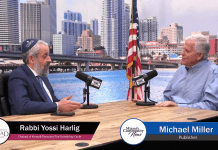

Impassioned pleas regarding three of nine Florida constitutional amendments facing voters on the Nov. 2 ballot provided lengthy discussions when only three of 11 office seekers appeared for the Kendall Federation of Homeowner Associations (KFHA) fourth and final “Candidates Night” on Sept. 20.
Neither candidates nor spokespersons turned out for Florida’s gubernatorial and U.S. Senate races, resulting in more time spent reviewing three amendments, one requiring voting referendums on land use and two that would affect how legislative and congressional district boundaries are drawn.
Attorney Jeff Bercow, who represents developers in many Kendall zoning matters, voiced the opposing viewpoint to the “Florida Hometown Democracy” movement, embodied in Amendment 4 that would require voter referenda on all comprehensive land use plan changes made by city and county governments,
“That would result in balloting ‘chaos’ in Florida’s 67 counties and its municipalities by providing 500- to 600-page ballot detail to contain the necessary legal language, he said.
In Clarabelle, FL, a community adopting a similar local statute, voters passed on 627 separate issues at the polls, Bercow stated, claiming Hometown “advocates were funded by a single individual’s $1 million contribution to purchase sufficient signers required for a statewide constitutional referendum by hiring a commercial signing firm.”
A Florida League of Women Voters publication noted that the Hometown movement is led by a land use attorney with backing of the Sierra Club with opposition by the Florida League of Cities and Florida Chamber of Commerce. Bercow urged voters to visit www.Florida2010.org for opposition details.
Sharing the floor at the end of the meeting was former FIU law student Tiernan Cole representing the Florida Chapter, American Civil Liberties Union, making a special plea to re-district Florida’s legislative boundaries with a “yes” votes on Amendment 5 and changing congressional boundaries on Amendment 6.
“We only have this opportunity every 10 years to end gerrymandering that self perpetuates incumbents in office, statewide and nationally,” declared Cole, a Palm Beach resident who said he was contributing his time for the cause before taking his bar exam.
Voting for both amendments would allow redrawing legislative and congressional district boundaries to eliminate bloc voting for entrenched party candidates, he said.
Cole distributed a document illustrating House District 78 that has various western sections of St. Lucie, Okeechobee, Martin and Palm Beach counties forming a single voting district, as well as “nearly half of Lake Okeechobee.” He asked audience members to visit FairDistrictsFlorida.org for details.
Lack of time and absence of spokespersons canceled discussions on six other amendments, including Amendment 8 proposing to raise recently mandated classroom size limits to soften budgeting and curricula effects in Florida’s public schools.
Miles Moss, KFHA president, said voters could visit the Florida League of Women Voters’ website at LWVG@comcast.net to view pro and con recaps of all nine amendments at a link titled “Making Sense of the Amendments.”
Candidates compete
in two state districts
With opponent Anitere Flores failing to appear, Dr. Les Gerson, a Miami veterinarian, had the floor to himself to push for a platform varying from paying for dog licenses to solving Kendall’s traffic problems and seeking more equitable taxing in his bid for the Florida Senate District 25 seat.
A political newcomer, Gerson represents a Democratic attempt to defeat Republican Flores who at last count had campaign funding of $576,000 to gain the GOP senate seat in the Florida Legislature formerly held by term-limited Alex Villalobos.
Attorney Joe Garcia and Whig Party candidate Craig Porter were the only opposing candidates to provide differing in-person views with Rep. David Rivera and Roly Arrojo absent. All four are running for the District 38 Congressional seat left open by U.S. Rep. Mario Diaz-Balart, fourth-term GOP representative who switched from District 25 to seek the House Seat 21 left open by retirement of his brother, Lincoln Diaz-Balart.
Garcia, a Cuban American politician and former executive director of the Cuban American National Foundation, ran unsuccessfully as a Democratic candidate in 2008 against Mario Diaz-Balart. He stressed that “South Florida has not had a Democratic voice in the House for all too many years.”
Porter, a general contractor in his family’s construction business, said he was Florida’s first Whig Party candidate in 150 years, saying he chose not to run with a major party so he could remain independent of “big government” and its political thinking.
Both Garcia and Porter agreed the current approach for local federal funding needed restructuring.
Garcia illustrated that “one billion-plus dollars spent for a Port of Miami tunnel totally ignores the diminished role cross-country truck hauling will have once the Panama Canal is deepened. Then, we will need a 50-foot deep port, not the 30-foot depth we now have, after increased cargos go aboard ships with east or west destinations, rather than depending upon truck carriers,” he said.
Porter’s basic philosophy would reduce federal intrusion into “affairs better handled by state or local governments,” commenting the people “who run our governments at the lowest levels know best how to administer funds economically and with better judgment for their use.”





